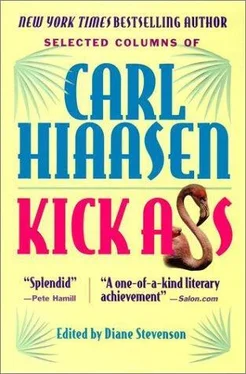For years the cookie jar was controlled by the slippery-fingered duo of City Manager Cesar Odio and Finance Director Manohar Surana. Unfortunately, neither fellow demonstrated the fiscal expertise to manage a Crandon Park hot-dog stand, much less a $275 million budget.
They were able to hold their jobs mainly because the politicians who hired them remained, conveniently, uninterested in simple arithmetic. As long as a few bucks were left lying around for pet projects, commissioners were content to let Odio and Surana juggle the numbers.
Evidently they took advice from the distinguished accounting firm of Deloitte, Cheech and Chong.
For example, the city for years failed to collect millions of dollars in overdue lease payments. In real-estate parlance this is called "getting stiffed by your tenants," a technical concept that someday may be explained to the commission.
It took a bribery scandal and a slew of felony indictments to reveal that Miami is sinking into a $68 million sludge pit of debt. Wall Street seems ready to downgrade the city's bond rating to "J," for joke.
Bottom line: If something drastic isn't done immediately, Miami will run out of dough in March or April. That could mean no cops, no garbage pickup, no firefighters, no pay.
So the commission, faced with the gravest crisis in its history, of course has done zilch. Commissioners continue to balk at doubling garbage rates, which would gain a few months of solvency.
Under Florida law, the state can take over a city that's going down the tubes. A special oversight committee can be appointed to handle its finances in an emergency.
That's what Miami Mayor Joe Carollo wants, and no wonder. It'll get him and his pusillanimous pals off the hook. Let somebody else hike fees and take the other painful, unpopular steps necessary to save the city.
The commission's lack of spine provides more ammunition for Miamians seeking to have the municipality dissolved. While those petitions circulate, Gov. Chiles should move ahead swiftly with a state takeover of the budget.
And there's really no need to notify the commission. Nothing would have to change down at City Hall.
Commissioners can continue to hold regular meetings, just as they do now. Pass a few meaningless resolutions. Honor a few good Samaritans. Name a few streets after their campaign contributors.
Somebody can even jot down the minutes. Televise it, too, just for giggles.
Carollo can continue as make-believe mayor. Ed Marquez can be the make-believe city manager. As a lark, somebody can even serve as make-believe finance director.
And the rest of the commissioners can sit on the dais and pretend they're doing a job, pretend the city is in good hands, pretend somebody honest is handling the budget.
The same as they've been pretending all along.
Only this time they officially won't have control of the taxpayers' money.
But if nobody tells them, it'll probably take years before they figure it out.
So, ssssshhhhhhh.
Miami's fiscal crisis: Look at the bright side
December 5, 1996
An Open Letter to America from the City of Miami:
As everybody knows, our city is in the throes of a financial crisis. The media coverage has been so gloomy that tourists, newcomers and investors are being frightened away.
It's time to clear the air, set the record straight and take the bull by the horns. The bad news: Miami is so broke that the state of Florida has stepped in to try to stave off bankruptcy.
The good news: Our days of harebrained spending, bumbling management and corruption are temporarily over, because there's basically nothing left to waste, misspend or steal.
Heck, we're in the hole by 68 frigging million bucks—who'd try to rip us off now? Which brings up the first of several ugly misperceptions that must be addressed.
• Misperception 1: The entire city is corrupt.
Flatly untrue. Not one current Miami commissioner or administrator is under indictment, house arrest or the regular supervision of a parole officer—a record we're darn proud of.
Most city employees are honest and hard-working, except for a few deadbeat relatives and cronies of politicians. So what if there's an ongoing criminal investigation. Don't tell us the FBI never body-wired any informants at your city hall!
• Misperception 2: The city infrastructure is a disaster.
To begin with, "disaster" is a relative term. Miami hasn't been flooded by a hurricane or leveled by an earthquake. Most nights it's not even on fire.
And if it was, we've still got plenty of skilled firefighters on the payroll, at least until March or possibly April.
• Misperception 3: The city is a dangerous place to live.
Oh, come on. If Miami was so unsafe, would Madonna and Sly Stallone own homes here? No way. Not even with their high-voltage fences and beefy bodyguards.
And don't forget Pat Riley. He could've coached an NBA team any place he wanted, but he chose Miami. Why? Not just because of the incredible contract he got, but because he wanted to be in a city that offered his family the very finest selection of high-voltage fences and beefy bodyguards.
• Misperception 4: The city is unsafe for visitors.
Contrary to what you've heard, the streets of Miami haven't been overrun by gangs and drug dealers—well, most of the streets haven't. Pat Riley's, for example.
And we've still got hundreds of experienced police officers on the payroll, at least until March or possibly April.
• Misperception 5:The city is a risky place to invest money.
Once more, "risky" is an awfully broad term. Perhaps you just like adventure. Maybe there's some riverboat gambler in your blood. Come on down and take a chance on Miami.
Given the negative publicity, it's understandable if major corporations and commercial investors are apprehensive about the city's ability to provide basic services, such as garbage pickup.
Be assured we've got some of the most efficient garbage collectors on the whole Eastern seaboard, at least until March or possibly April.
• Misperception 6: The city is about to be abolished.
Again, the word "abolished" can mean so many things. Remember that Miami is more than just arbitrary boundaries on a road map—it's a state of mind.
Say, for the sake of argument, that the city charter is dissolved. The magic wouldn't die. Miami wouldn't suddenly disappear. It would still be right where it is today, smack dab between the airport and the beach.
Which means you suckers still have to drive through the place, regardless of what happens in March or April.
Suarez's act won't play on Wall Street
December 4, 1997
Miami Mayor Xavier Suarez is in New York today, still trying to convince Wall Street that the city is in tiptop shape. Before he comes home, he should drop by Bellevue for a checkup.
Because the mayor is either certifiably nuts or seriously under-medicated.
In only a few short weeks, he has single-handedly managed to undermine both Miami's image rebuilding and its fiscal recovery, which were well under way before he took office.
First, Suarez dumped the well-regarded city manager, Ed Marquez. Then he declared war on the state oversight board that essentially had saved Miami from bankruptcy.
No wonder Moody's Investors Service, an important bond-rating firm, warned that the mayor's actions "have introduced significant uncertainty" about Miami's future, and "could disrupt or even reverse [the city's] recent progress toward fiscal recovery."
The firm added: "There does not appear to be any financial experience at the helm right now." In other words, the inmates are running the asylum.
Suarez's transformation from a reasonably bright, thoughtful guy to a babbling fruitcake has been both astonishing and sad to watch. Erratic, impulsive and imperious, Suarez has morphed into the delusional loner we once predicted of his predecessor, the tightly wound Joe Carollo.
Читать дальше









